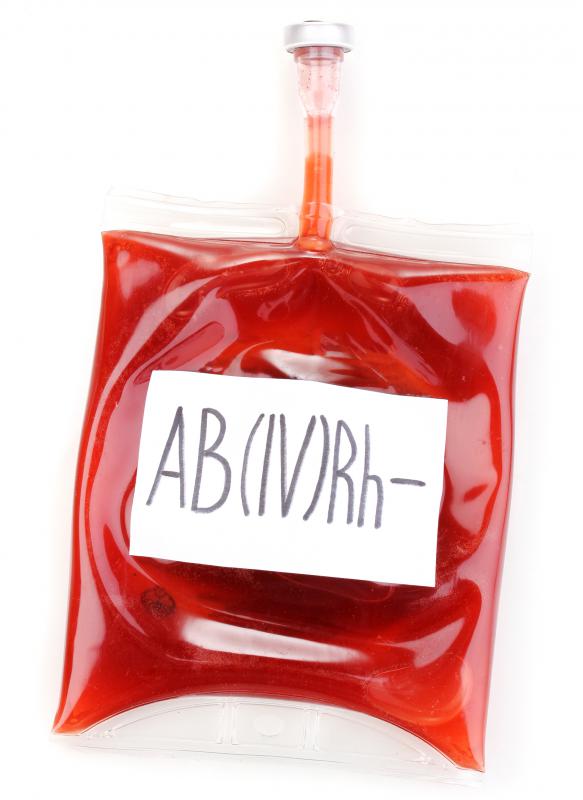At WiseGEEK, we're committed to delivering accurate, trustworthy information. Our expert-authored content is rigorously fact-checked and sourced from credible authorities. Discover how we uphold the highest standards in providing you with reliable knowledge.
What is the Most Rare Blood Type?
Globally, the overall rarest common blood type is AB negative, followed by B negative. Beyond the common grouping system, there are many other blood types that are rare or only specific to narrow demographic groups. There are also several diseases with rare or mutated antigens, which are surface signaling molecules on the blood cells, which give individuals incredibly unique blood types.
The most widely used categorization system for blood is the ABO grouping system, which classifies blood according to the presence of surface antigens A and B. Individuals have two alleles, or gene sequence units, each of which usually codes for the A antigen, the B antigen, or neither, which is referred to as O. Those who possess one copy of A or B and one copy of O are still said to have a blood type of A or B, while only those who possess two copies of O are said to have a blood type of O. Despite this fact, the O blood type is the most common, while AB is the most rare blood type.

Additionally, the Rhesus (Rh) grouping system classifies blood based on whether or not blood cells posses the Rh factor, another antigen commonly found on the surface of the cells. In the United States, for example, only about 18% of white Americans, 7.3% of African Americans and Hispanic Americans, and 2% of Asian Americans are Rh negative. The remaining percent of the United Stsates population is Rh positive and contains the antigen. When combined with the ABO system, AB negative and B negative are the rarest overall blood types.

Beyond these simple grouping systems which apply to a large percentage of the population, there are over 600 other specialized surface antigens. Individuals in certain ethnic groups will contain more similarities with respect to these antigens, and some specific groups experience a more rare blood type. This is why blood donations and transfusions from patients with similar ethnic backgrounds can reduce the likelihood of complications or rejections.

There are also several diseases that could result in some of the most rare blood type expressions, including McLeod Syndrome, a genetic disorder, or the absence of the Duffy antigen, which occurs more frequently in populations that experience higher rates of malaria. It is also possible for an individual’s blood type to change over the course of his or her life. Blood transfusions and transplants, especially bone marrow transplants, can gradually change an individual’s blood type to the donor’s blood type. Bone marrow transplants contain precursors that will eventually form new blood cells, increasing the concentration of the donor’s blood type over time.
AS FEATURED ON:
AS FEATURED ON:















Discussion Comments
My daughter n law had a set of twins boy and girl. My son is A negative and she is B negative. The girl is B positive and the boy is B negative. Is it possible that he is not the father? Can two negative people make a positive child?
How is the AB- blood type the rarest when they receive from their own and O- while O- blood gets from their own!
Follow up to post #4, I looked this up. Parents with O and AB blood type can only produce children with blood types A or B. Types AB and O are not possible from what I read.
"My parents are type AB and type O. Their four children all have different blood groups, Type B, Type A, Type AB and Type O. In that order. How is that possible?"
Ouch! From what I understand, a child with type O blood is not possible with your parents' blood types as you posted. The parents of a child with O type blood would come from parents who both have type O blood. Types A, B and AB are all dominant over type O. I would sit down with mom for a serious conversation. Are you sure you have everyone's blood types correct?
My parents are type AB and type O. Their four children all have different blood groups, Type B, Type A, Type AB and Type O. In that order. How is that possible?
My mother and brother were told they have a rare type ABCDE-. I can't find any info on this blood type. Do you have any info on it, please?
Post your comments